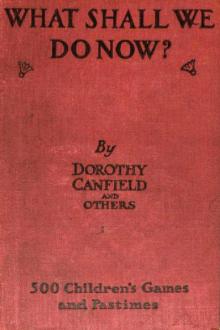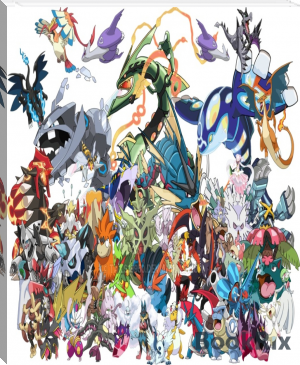What Shall We Do Now? by Dorothy Canfield Fisher (books on motivation .TXT) 📖

- Author: Dorothy Canfield Fisher
- Performer: -
Book online «What Shall We Do Now? by Dorothy Canfield Fisher (books on motivation .TXT) 📖». Author Dorothy Canfield Fisher
If you have a watch it is rather interesting to guess the exact time at which the train will reach the next station. The one who guesses nearest becomes the holder of the watch until the next guess is decided. Other things can be done with a watch, particularly if it has a second hand. Guessing the length of a minute is rather interesting, or timing the speed of the train by noting how long it takes to go between the telegraph-poles at the side of the line.
Hot-HandThis is a primitive game, capital for cold weather, for it is well named. It is played by two people, one of whom spreads out his hands flat, palms up. The other puts his, palms down, within about three inches of the other's, and tries to strike them a smart blow. If the first player can withdraw his hands quickly enough so that they are not touched it is his turn to try and strike. As long as the player whose hands are palms down can strike the other's hands he can go on. This is an excellent game for cultivating quickness. The player whose hands are to be struck will find that he can succeed better in escaping the other's blows, if he watches his eyes rather than his hands.
This can be arranged among many players as a sort of tournament, trying out the players by couples until finally the two best contestants are left to struggle for the championship. This is a good game to play while getting your breath after skating—or at any time out of doors when you are obliged to be quiet, and there is danger of getting chilled.
Pencils and PaperIt is well to take a pencil and paper when you go on a long journey. If the train rocks a good deal it is interesting to see which can write a sentence most clearly. There is a way of balancing oneself on the edge of the seat and holding the paper on one's knees which makes for steadiness. It is never too shaky for "Noughts and Crosses."
Noughts and Crosses or Tit-tat-toe"Noughts and Crosses" is playable anywhere; all that is needed is a piece of paper—a newspaper will do—and a pencil. The framework is first made. Thus:—
One player chooses crosses and the other noughts, and the one who is to begin puts his mark—say, a cross—in one of the nine squares. The other puts a nought in another of the squares, and so it goes on until either three noughts or three crosses are in a straight line in any direction. Thus, this is the end of a game in which noughts played first and crosses won:
But it often happens that the game is drawn, as in this example, in which noughts played first:—
A blank book for "Noughts and Crosses," with the framework all ready, can now be obtained. It has places for the names of the players, and the date.
Paper French and English"French and English," another game for two, belongs to the family of "Noughts and Crosses," and can be played anywhere and on any scrap of paper. You first decide which will be English and which French. Each player then takes one-half of the paper and covers it with, say, sixty dots. It does not matter how many, but there must be the same number on each side. Then in a corner each draws a cannon, or draws something that can be called a cannon for the purposes of the game. You then decide how many turns you will have. The game is played by placing the pencil on the cannon, shutting your eyes, and dashing the pencil across your enemy's side of the paper, straight or crooked, in any direction you like. Then you open your eyes, count how many dots the pencil line has passed through, and score them down. The player who, at the end of the number of turns settled upon, has gone through the greatest number of dots is the winner.
"Letters" and WordsA box of letters is an unfailing help to pass the time. A word will sometimes keep a player puzzling for hours, which is, of course, too long. "Pomegranate," "Orchestra," and "Scythe" are good examples of difficult words.
You can also take words and sentences seen on the journey, such as "Wait till the train stops," and "Pears' Soap," and see how many words they will make. A more difficult task is to make anagrams of advertisements. "Lipton's Teas," for instance, makes "Taste on, lips."
"Letters" With a PencilThe word-making game has been adapted into a writing competition. Each of the company is handed a card which has been prepared for the purpose beforehand by having names of a dozen animals, or towns, or flowers, or birds, or whatever it may be, written on it in what might be called twisted spelling. For instance, "butterfly" might be spelled thus, "trelbyfut," and "Manchester" thus, "Tramschene." A certain amount of time is given, and the winner is the player who has found out most words therein.
A version of this game is to dot out all the letters of the word except the first and the last. You would put "Elephant" on the paper thus, E......t, and tell your companion it was the name of an animal. Or you might write "Peppermint" thus, P........t, and tell him it was the name of a sweet.
HangingThis is a more difficult game, very suitable for a tiring journey. The two players sit side by side, and one of them dots out on a piece of paper the words of a proverb or well-known line of poetry. Thus, "I met a little cottage girl" would be set down in this way:—
. ... . ...... ....... ....
Underneath this line a small gallows is erected. Thus:—
The game is for the other player to discover the line. In order to do this he is permitted to ask his opponent for letters. Perhaps he will begin by asking, "May I have an 'a,'" because there are few sentences that do not contain an "a." His opponent will then put the first "a" in. Thus:—
. ... a ...... ....... ....
Then perhaps another "a" will be asked for, and the line will come out thus:—
. ... a ...... ....a.. ....
Then perhaps an "e":—
. .e. a ...... ....a.. ....
So far all has gone favorably with the guesser, and the gallows is still untouched. But perhaps he will now venture to ask for a consonant (which is much more risky than a vowel), and will say, "May I have an 's'?" As there is no "s" in the line the reply will be against it, and the opponent will at once append to the rope of the gallows a small head. Thus:—
This means that the guesser has lost one out of a possible six points, the others being his body, his two arms and two legs. For each letter he asks for in vain he loses one of these, and when all have gone he has lost the game too. Sometimes, however, the quotation can be detected very quickly.
Other GamesMany games usually kept for the house can be played in the train. "Old Maid" (see p. 79) is a good train game; so is "Buz" (see p. 167). A "Fox and Geese" board, or a draughtboard, will help to pass the time.
FoodFood is a great help toward shortening a long journey. A little picnic every hour, if it is permitted, is something not too distant to look forward to, and it may take up ten minutes each time. A larger meal all at once may, of course, be more convenient, but, if not, the hourly picnic is worth trying.
Chinese GamblingThis is the simplest game possible but will while away endless hours. It is played with nothing but your hands, which are made to assume three positions: one with clenched fist; one spread out flat; and one with first and second finger spread apart like the blades of scissors. The first is called "the stone," the second "the paper" and the third "the scissors." Very rapidly both players strike their right hand (clenched) into the left palm three times, and then both at the same instant bring up the right hand in one of the three positions. The winner is determined by this formula: "Scissors cut paper. Stone breaks scissors. Paper wraps stone." That is if you have made your hand "the stone" and your companion "the paper," he wins. But if you had chosen "the scissors" you would have won. The winner must call out the formula that fits the case, "Scissors cut paper" for instance, and count is kept of the number of losses and gains. The one who comes out ahead after a half-hour's contest is the winner of that bout.
Among the best toys with which to play alone are bricks, soldiers, balls, battledore and shuttlecock, and dolls. No one needs any hints as how to play with them; but it might be remarked that ordinary bought bricks being rarely what they should be, it is better, if possible, to get a carpenter to make some of a more useful size, say four inches long, one and a half inches wide, and an inch thick. With a hundred of these you can do almost anything in the way of building, and if made of tough wood they ought to last forever.
SoldiersA good game of soldiers is to see how many shots are required from a cannon to kill the whole regiment. The cannon can either be a spring cannon or a pop-gun, or a pea-shooter. Just at first it is almost impossible not to clear off two or three men with each shot, but later it becomes more difficult and exciting.
NinepinsWith a box of ninepins very much the same game can be played. In wet weather, in the hall, a box of large ninepins is invaluable.
Spanish Cup and BallA good quiet game to play alone is "Spanish Cup and Ball." A long stick has fastened to it a loop of wire standing out at right angles, thus. To this is attached by a long string a worsted, or a very light rubber ball. The game is to see how many times you can throw the ball up to the ceiling and catch it in the loop of wire as it falls.
All kinds of balancing games are excellent when you are alone and tired of toys. There is no way to acquire proficiency in these but by practice, but practice is fascinating work. Try balancing at first a long pole (an old broom-stick handle will do) on the palm of your hand, then on your finger, then on your chin and forehead. The longer the pole, the easier to balance it. Remember one golden rule. Keep your eyes on the top of the pole.
Then try balancing a whole broom, or a chair. The practice of balancing is excellent for training yourself in quickness of eye and muscle.
Of course bricks and soldiers and ninepins, as well as balls (see p. 139), are more interesting





Comments (0)